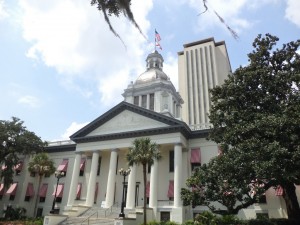 School choice-related measures faltered amid a legislative standoff in Florida, as the House adjourned early and bills foundered in the Senate.
School choice-related measures faltered amid a legislative standoff in Florida, as the House adjourned early and bills foundered in the Senate.
Going into the legislative session, groups across the political spectrum agreed an overhaul of the state’s testing and accountability system was the top priority. In the end, that was one of the few education bills to reach Gov. Rick Scott.
Some school choice ideas may have hope for revival, if they’re connected to the state budget. Lawmakers are expected to reconvene to hash out a spending plan before the current one expires at the end of June.
A number of issues that fell apart in the final days of this year’s regular legislative session — charter school facilities funding, a second round of digital classrooms legislation, an expansion of Personal Learning Scholarship Accounts for special needs students — relate to the budget in some way. (The scholarship account program is administered by organizations like Step Up For Students, which co-hosts this blog and employs the author of this post).
Other ideas, like an expansion of public school choice, might have to wait until next year.
Here’s a rundown of where key school choice issues ended up.
Charter schools. The House passed, and the Senate advanced, proposals that would have created a new charter school institute at Florida State University, clarified districts’ authority to screen charter applicants, and made it easier for high-performing charter schools to replicate in certain areas. Given the amount of attention shuttered charters received going into the session, it’s hard to imagine the issue of charter school quality, which those measures were meant to address, going away next year.
There were unresolved differences between the chambers on other issues, including new ethics requirements proposed in the Senate, and a facilities funding plan passed by House.
Parental rights and public school choice. At first, the idea of creating open enrollment for public schools in every school district, and allowing parents to send their children to schools across county lines, drew a number of logistical concerns from school districts. But changes made later in the session allowed HB 1145 to clear its final committee unanimously and pass easily off the House floor, only to die in the Senate during the tumultuous end of the session. By then, most of the objections to the public school choice legislation centered on other parts of the package, dealing with issues like charter schools and the teaching profession.
Personal Learning Scholarship Accounts. Legislation that would expand the state’s newest parental choice program for special needs students passed both chambers unanimously, but died in part because of differences that couldn’t be reconciled after the House left town. The issue, or at least some aspects of it, may be addressed in the state budget.
Dual enrollment. Private schools hope to have full access to college credit courses restored for their students. This issue could, at least in theory, be addressed in the state budget.
Digital learning. Digital classrooms legislation may come up during budget talks in the coming weeks, because it’s related to funding for school technology. Stay tuned.
Extracurricular activities. High school sports has become a perennial issue, meaning there’s a good chance it will resurface next year. There is a difference of opinion among some school choice supporters about how to address it.
Principal autonomy. The House passed legislation creating a pilot program allowing select school districts to offer charter-like autonomy to some of their principals. The Senate included a version of the idea in its big school choice package that died late in the session.
Early learning. The House’s version of the state budget included a 1.75 percent funding increase for voluntary prekindergarten, which is one of Florida’s most popular school choice programs. It’s not clear what will become of that proposal if lawmakers reconvene this summer as expected.



[…] Read the full update at RedefinED. […]
Another Western commercial hotspot is Utah, a state with low
power expenses and business pleasant regulation. Salt Lake City,
12th on our large metro location listing, has actually enjoyed a 5.7 % boost in commercial tasks because 2010.